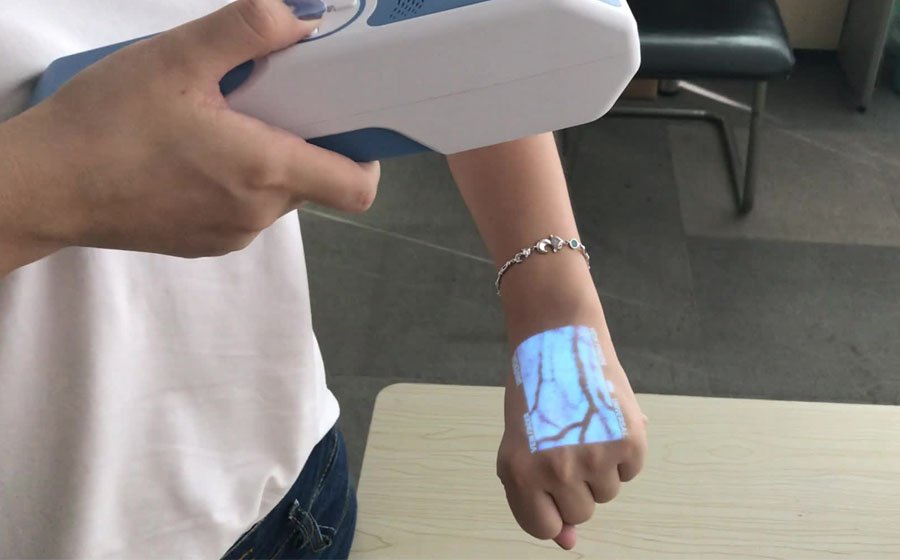A vein finder is a medical device that helps locate veins in the body for intravenous (IV) access. It is most commonly used by healthcare providers during blood draws and IV insertion. There are many different types of vein finders available on the market, each with its own unique features. Here are some of the most important features to look for when choosing a vein finder.
Table of Contents
Important Features in a Vein Finder
Brightness
When choosing a vein finder, one of the most important features to look for is brightness. The device should be bright enough to easily see the veins, even in difficult-to-see areas such as the hands. Many vein finders have an adjustable brightness level to allow for different lighting conditions. Make sure to test the brightness of the device in a variety of lighting conditions to ensure it will work for you.
Infrared Technology
Another important feature to look for in a vein finder is infrared (IR) technology. This type of technology uses invisible light to illuminate the veins beneath the skin. IR vein finders are often more effective than traditional bright light devices, as they can provide a better view of the veins.
Adjustability
The ability to adjust the brightness of the light source is important so that you can see veins clearly without causing undue discomfort to the patient.
Durability
Given the often-rugged environment in which vein finders are used, it is important that they are built to last. Choose a model that is made from high-quality materials and backed by a solid warranty.
Ease of use
A good vein finder should be easy to operate, even for first-time users. Look for models with intuitive controls and clear instructions.
Portability
Another important factor to consider is portability. If you are going to be using the machine in multiple locations, it is important to choose a machine that is easy to transport from one place to another. A lighter, more compact machine will be easier to carry and set up in different locations.
Accuracy
It is critical that a vein finder be accurate in order to avoid missed or delayed IV insertions. What’s the point of having a vein finder if it’s not going to help you locate the vein? Look for a model that has been tested for accuracy and Look for models that have been tested and validated by independent third parties.
Affordability
Given the wide range of prices for vein finders, it is important to choose a model that fits your budget without sacrificing quality or performance. Many of the cheaper models on the market are just as good as the more expensive models, so don’t feel like you have to spend a lot of money to get a good machine.
Compatibility
If you are going to be using the vein finder with other medical devices, it is important to make sure that it is compatible with those devices. For example, some vein finders can be used with ultrasound machines to provide a more accurate view of the veins.
Battery life
Another important consideration is battery life. If you are working in a hospital or clinic, you will likely be using the machine for long periods of time. A machine with a long battery life will save you time and frustration.
Customer support
If you have questions or problems with your vein finder, it is important to have access to reliable customer support services. Look for manufacturers who offer 24/7 telephone support or live chat services.
User reviews
One of the best ways to get an unbiased opinion about a product is to read user reviews from people who have purchased and used it themselves. When evaluating user reviews, pay attention to both positive and negative feedback in order to get a well-rounded perspective on the pros and cons of a particular model.
Return policy
In the event that you are not satisfied with your purchase, it is important to choose a manufacturer that offers a hassle-free return policy. This will allow you to return the product for a full refund if necessary.
FAQs About Vein Finders
Q: Is it painful to use a vein finder?
A: No, it is not painful to use a vein finder. The light from the device is not strong enough to cause any discomfort.
Q: How accurate are vein finders?
A: Vein finders are quite accurate, especially when used by experienced professionals. However, there is always a small margin of error with any medical device.
Q: Can I use a vein finder at home?
A: Yes, you can use a vein finder at home. However, it is important to consult with a medical professional before using the device.
Q: How much do vein finders cost?
A: The price of a vein finder varies depending on the features and quality of the device. You can expect to pay anywhere from $50 to $5,000 for a vein finder.
Q: Do I need a prescription to use a vein finder?
A: No, you do not need a prescription to use a vein finder. However, it is always a good idea to consult with a medical professional before using any medical device.
Q: Are there any side effects associated with using a vein finder?
A: No, there are no side effects associated with using a vein finder. The light from the device is not strong enough to cause any harm.
Wrap Up
If you are looking for a vein finder, then it is important to know the features that are available in order to make an informed decision. This guide provides detailed information on some of the most important features that you should look for when choosing a vein finder. we hope that this guide has been helpful and that you now have a better understanding of the different features available.










